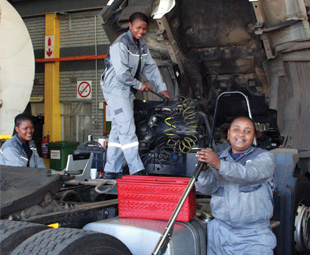MAN brews grrrl power

Fixing a truck is a man’s job, right? Wrong! Three young women apprentices at MAN’s Isando truck and bus workshop are proving that what they lack in grunt, they make up for in theoretical and practical diesel savvy. FOCUS investigates
Definition: Girl Power or Grrrl Power – Power exercised by girls; spec. a self-reliant attitude among girls and young women manifested in ambition, assertiveness and individualism.
Like most school-leavers in 21st century South Africa, Thembi Nkosi and sisters Thando and Kwanele Oliphant faced many challenges when it came to finding permanent employment in fields they have a passion for.
“I gained an N4 qualification in diesel mechanics from Middelburg Technical High, but finding employment as a diesel mechanic was not easy. I spent six months going to interviews with all sorts of automotive companies until I signed the four-year apprenticeship contract with MAN,” says Thembi.
For Thando and Kwanele, who both graduated with matric certificates from Jabulani Technical High in Soweto in 2004 and 2005 respectively, barriers to entry into the industry made it extremely difficult for them to find full-time employment that offered genuine career prospects.
“I studied welding and metalwork at school and I have a love for cars, but somehow that was not enough to secure a technical job at the many automotive companies I approached in the years after matriculating. It was a great relief for me when I heard that I could specialise as a heavy-duty diesel technician at MAN through the four-year apprenticeship programme,” says Thando.
That heavy-duty trucks and buses are fitted with components that can weigh in excess of 300 kg apiece, like axles and engine blocks, may have something to do with the reluctance on the part of commercial vehicle companies to employ women, considering them insufficiently muscled to handle the workload. In the case of automotive electrician apprentices, the scenario is quite different.
“My main piece of equipment is a laptop computer, instead of a torque-wrench,” says Kwanele, who is undergoing a two-year auto-electrician apprenticeship at MAN. “My work is by no means as physically demanding as a diesel mechanic’s tasks, but it is definitely more mentally exhausting.”
Both apprenticeship courses at MAN’s Apprenticeship Academy are MERSETA-accredited and comprise 50% theoretical and 50% practical training. The theoretical curricula are compiled according to a skills development model known as CBMT (competency-based modular training) that can be adapted to suit the existing competency levels and skills needs of individual learners.
The diesel mechanic CBMT training comprises four levels, rolled out over four years. In their first year, Thando and Thembi learned from 13 modules covering both generic automotive and diesel mechanic skills, including training in the motor industry, safety and first-aid in the workshop; identifying lubricants, materials and metals, the care and use of applicable tools, identifying locking devices, gaskets, seals and heavy-duty vehicle components, understanding the fundamentals of lubrication and electricity, and how to perform a minor service to a heavy-duty vehicle.
Both women are now in their second year of the programme and are mentored by MAN’s Isando workshop manager, Henry Labuschagne, who conducts on the job training (OJT) with his apprentices for 11 months of the year. The Level-Two courses, spread over a five-week period of classroom lectures, include understanding the fundamentals of heavy-duty vehicle technology, identifying various bushes and bearings and how to replace them, the removal and replacement of heavy-duty vehicle engines and sub-systems, drive-trains, cooling systems, suspension systems and electrical architectures.
“It is extremely physical work and I am exhausted at the end of a busy day,” says Thando, “but the correct use of the tools and repair machinery does make things easier. I prefer working on trucks because you simply tilt the cab and everything is there, right under your nose. Buses are more of a challenge to work on, because they do not have a tilting cab and you have to remove body parts to get to various components. Month-end is always a busy time for us and we work extra hard to clear the workshop of vehicles that are in for repairs and servicing.”
Kwanele’s apprenticeship as an auto electrician follows the same CBMT/OJT programme but is rolled out over two years. Level-One (first-year) training is very similar to that of the diesel mechanic course with a bias towards the electrical systems of trucks and buses. Now in her second (and final) year as an auto electrician apprentice, Kwanele is learning the basics of vehicle electronics, wiring systems and how to diagnose electrical faults using the latest MANCATS computer. She will undergo training on how to identify, assess and repair everything from vehicle charging and ignition systems to the repair of peripheral electrical and electronic components.
“The modules are very useful because they also cover the fitment and maintenance of aftermarket vehicle accessories, which helps make my skills more marketable. The trucknology trucks like the MAN TGA and TGS WW are a pleasure to work on because electrical faults are easily identified by the computer software. Older vehicles like the F2000 don’t have on-board computers so I have to use multimeters and follow a lengthy process of elimination to fault-find,” says Kwanele.
For all three women, the MAN apprenticeship programme has set them on well-defined career paths. Not only do they earn respectable salaries in their current positions, but they gain exposure to the many different employment opportunities the commercial vehicle industry has to offer.
“I’m looking forward to learning how to repair turbochargers and vehicle management systems in the next two years of the programme,” adds Thando. “After completing my apprenticeship, I want to study logistics and supply chain management.”
Thembi has her sights set on a career in fleet management, while Kwanele’s long-term goal is to obtain a university degree in project management specialising in electronics.
Clearly, all three have big dreams of working in fields they love. Graduating from MAN’s Apprenticeship Academy will not only provide them with globally recognised and much sought-after heavy-duty diesel technician skills, but provide a solid platform upon which to launch their careers as executives in the commercial vehicle industry.
Go get ’em GRRRLS!
Published by
Focus on Transport
focusmagsa




